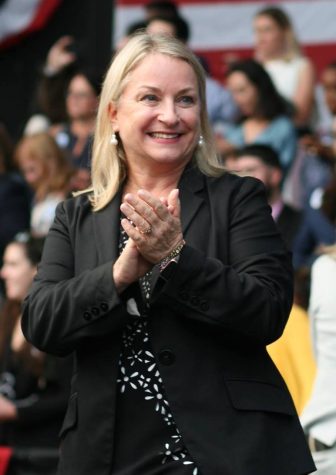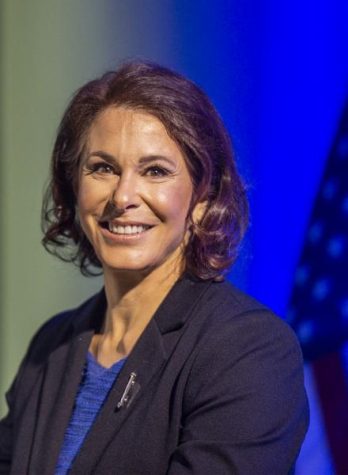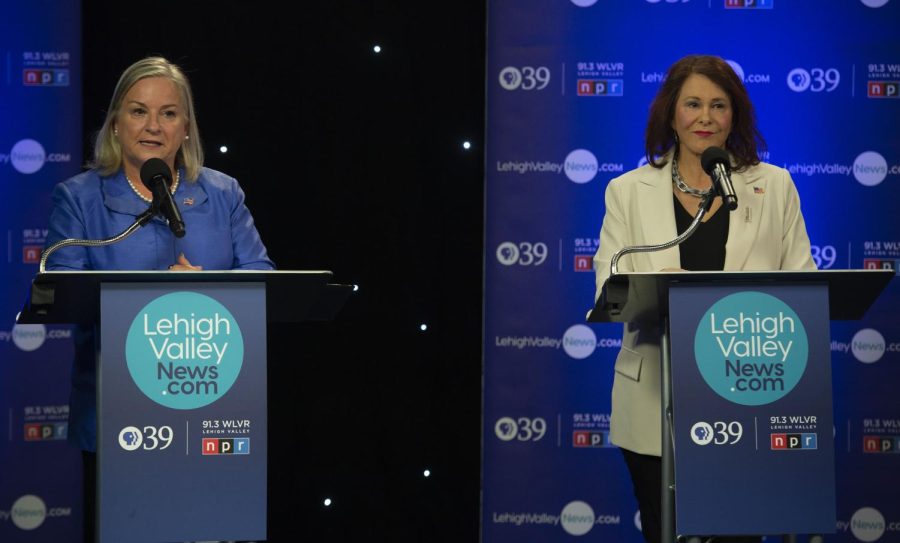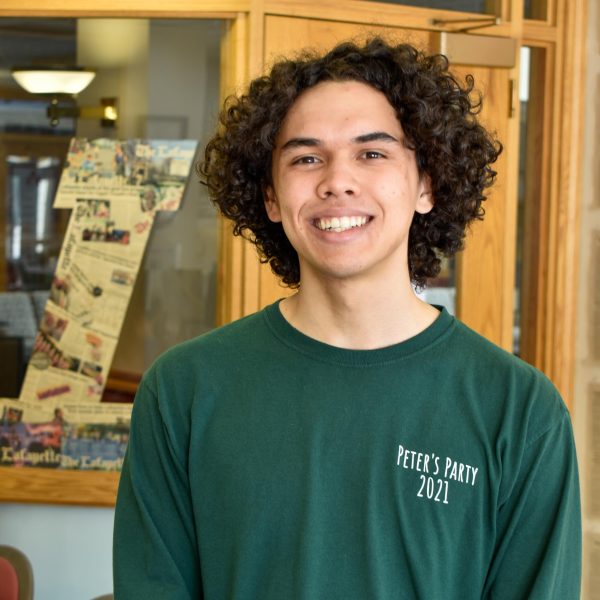Pennsylvania’s Seventh U.S. House District race is proving to be one of the most competitive in the nation. Susan Wild, the incumbent two-term Democrat, is in a dead heat with her second-time Republican rival, businesswoman Lisa Scheller, due to conservative Carbon County being drawn into the district as well as blowback against Democrats over economic challenges. The Lafayette sat down with both Wild and Scheller to hear their takes on education, abortion, the economy and more.
Some responses have been edited for brevity and clarity.
Polls are showing the race within a percentage point while the 2020 race saw over a three-point gap. Why do you think this race is so competitive?
Susan Wild (D): I won by 3.8, but who’s counting? Redistricting gave me a new map, and it’s a very competitive district. It’s interesting. We should be kind of proud of that. Across the country, there are only about 25 competitive districts. Every other district is safe blue or safe red. And as a result, when you get to Congress, people in those districts literally just tow the party line. And the nice thing about being in a purple district is it’s intellectually challenging. You’ve got to think about your votes and you’ve got to think about what matters to the people of the district.
Lisa Scheller (R): I think this race is close. I will keep running as hard as I possibly can until I get through that wire on November 8. I have a level of confidence in my ability to prevail, but this race is very critical nationally in taking back the House for Republicans so it has garnered a lot of national interest. Quite frankly, the polls are all over the place. Some people say it’s a dead heat, some say I’m up, some say other things. The fact of the matter is that this race is the tip of the spear. It’s a bellwether for the entire rest of the country, so it is being watched from all over the country, and there is participation in this race from all over the country.
What can Washington do to alleviate the financial strain on Lehigh Valley residents?
SW: We’ve already done a lot. And it’s interesting, I have yet to hear any kind of plan that my opponent has for solving the global inflation problem that we have. But we in Congress have gone after large corporations that have been price gouging, particularly in the area of oil and gas prices. We have been working on making sure that we are diversifying our food chain networks so that not all of the meat processing is done by three plants and that baby formula isn’t produced by two or three companies so that when you have a problem with one of those factories, you end up with a shortage of formula. In addition to that, we just passed a bill that brings down the cost of prescription drugs. Not for everybody yet – that’s still part of my mission to make sure that gets broader. For a senior citizen, starting in January, if they’re on insulin, it’ll be capped at $35 a month. If they take other prescription drugs, the most they will ever be required to pay in a year is $2,000. That may sound like a lot to somebody at a younger age who doesn’t take a lot of medications, but I can tell you that I’m with seniors every single day who talked to me about their cancer medications, their heart medications and others that often cost more than $2,000 a month. So that’s a huge step. There are a lot of worldwide causes of inflation. I’m not going to get in towards the root causes. We could but we don’t have to. But in terms of really trying to come up with pragmatic, commonsense solutions we’ve been doing, I will continue to work on those things.
LS: Well, the first thing that we can do right now is rein in inflation. Number one thing. As someone who creates jobs and as someone who has done business, I understand the economy, I understand the labor shortages, the inflation, the regulations. Things that are going to help grow our economy are things that are going to help rein in inflation. But first, we have to stop the egregious spending that’s going on. And I’ll be honest, it’s been by both parties. Spending is approaching $9 trillion in the past two years, and we just can’t spend like that. Maybe we have to reverse some of that spending. One of the things that I would do upfront is probably not hire 87,000 new IRS agents at a cost of $80 billion because you know that they’re going to be going after middle-class Americans who are already struggling. The next thing I would do that relates to inflation – and it is something that I’m very, very strong about – is opening up America, and more particularly, Pennsylvania’s energy. Pennsylvania can and should be a world superpower for energy. We have the most pure liquefied natural gas in western PA, and enough of it to power our country for over 200 years if we could access it. And so we need to open that up. And not only would that provide for our economy to grow, but to slow inflation, for our businesses, our homes for our vehicles, we need reliable, domestic, affordable energy. We would not have to be buying energy from countries that don’t like America, and in fact, we could be exporting energy to countries that are now relying on sources of energy that are antithetical to freedom.

Do you support any federal restrictions on abortion?
SW: Roe was a Supreme Court decision. What we’re trying to do in Congress now is to create broad protections for women’s health care in general. And that’s not just about abortion, number one. Number two, I firmly believe that the government does not belong in anybody’s doctor’s office. Roe and Planned Parenthood v. Casey were judicial decisions in terms of the number of weeks and trimesters, and all that stuff. I believe we need to get to a place where we are trusting women and their medical providers to decide what they need to do in terms of their pregnancy. Pregnancy is far too complicated an issue for us to be legislating. So I wouldn’t say that I’m part of the “codify Roe” crowd. I would say that I am very much in favor of making sure that we are protecting women’s right to make their own healthcare decisions.
LS: The Supreme Court has ruled that most of these issues are going back to the states. And so that would not have anything to do with the federal level. But when it does come to the federal level, I am opposed to a constitutional ban on abortion. But I’ve also been lied about by my opponent. I do support exceptions for rape, incest and the life of the mother. And to make it clear, she does not believe there should be any restrictions on it at all up to and including full-term nine-month abortion, and partial-birth abortion at the taxpayer’s expense.
What is something you did in college that helped shape or will inform your legislative style?
SW (B.A. in political science, American University; J.D., George Washington University): You know, college and law school were incredibly important to me. So I can’t point to one formative experience, what I can say is that I think back on how much growth I experienced in both of those educational experiences, and how important it is that we make sure that young people can afford a higher education of their choosing, whether it’s in STEM education, whether it’s a liberal arts school, whether it’s a technical school. I just remember those years as really forming the person I am now.
LS (B.A. in math, University of Colorado Boulder; M.A. in manufacturing systems engineering, Lehigh University): The thing to point to about my collegiate years, particularly at Lehigh, that would shape my legislative style is I’m an engineer. I’m an industrial engineer. And engineers are problem solvers. We look at systems. We want to make them as effective as possible and as efficient as possible. And that’s what I want to help do with government: solve problems and make it effective and efficient. I view myself as someone who likes to creatively solve problems, it’s something I’ve been doing my entire life from the time I entered into recovery, at least. I grew up in Tamaqua – small-town girl from the area. I have always, for the vast majority of my life, spent my life between Schuylkill and Lehigh County. It’s a part of the country I came back to and I love, not just because of the diversity of the seasons, but its microcosm of the whole country between the rural and the manufacturing, the suburban and the urban areas and the different people who live here. It’s just a wonderful place to raise a family and a beautiful place to live. When I got into recovery I went to a trade school and I learned computer programming. My first real job as a young adult was working on programming next-generation weather radar systems that are still in use today. That was with just a trade school education, so I am a huge proponent of our young people getting the right education. It’s not always true that the right education is a college education. It could be a trade school education. I could have continued with my trade school education and I could have done extremely well. I was doing very well with it. And then I just decided to go back and get a college degree.

How can Congress help college students?
SW: Well, I think that if we could get the Simplifying Student Loans Act passed into law and signed by the president, it’s a great way to go about it. When I went to college and law school, I took out federal student loans. I worked three jobs in college, and I could not keep up with three jobs in law school. So I got federal student loans that had a one percent interest rate that didn’t start to accrue until one year after I graduated from law school. It seemed like I owed a lot when I graduated, but in retrospect, I realized that it was very affordable, and I think that should be the model for how students can afford school if they don’t happen to come from a wealthy family. We’ve got to make loans transparent. We can’t have the situation where 18-year-olds are signing away their future, don’t know what the interest rates going to be, or, you know, goes up. And we’ve got to make sure that we are pegging repayment to people’s circumstances. So some people graduate from college and get great well paying jobs. But there are a lot of fields that we need people to go into that are not particularly high paying, but we want them to go into them. And so we’ve got to make sure that we are creating incentives for people to go into those fields, whether it’s through loan forgiveness, restructuring of their loan, making sure that they’re able to take advantage of a lower interest rate or forbearance while they’re working initially. So there are a lot of things that can be done. But I just think the main thing is that we have to view it as an investment in our future.
LS: We need to work on college affordability for students, and that is being pushed in the wrong direction, right now, with administration growing in colleges. We need to make sure that people can pick the right college. It’s not always the one that they need to take out $120,000 worth of student loans to go to. At community colleges – another area that I’m very, very focused on – is something that students can get a good base education. Even in high school right now with dual enrollment, students can get two years of a college education that they can transfer to help make that education more affordable.
For the second cycle in a row, two Jewish women are running against each other to represent the Valley. What do you believe to be the significance of this fact?
SW: I see that as really more of a coincidence than anything else. We see more and more women running for office everywhere, including right here in our district. I think it’s great that more women are running for office. And I think the fact that we both happen to be Jewish is just, you know, a circumstance we share. There isn’t much that Scheller and I have in common, and in terms of policies, I think we have more in common on the topic of Israel than any other, but even there we have differences.
LS: I would be the first Republican Jewish woman to serve in the house in 35 years, the third in the history of the country. And right now, there are only two Jewish Republicans in the House and none in the Senate. So I mean, it would be kind of a landmark seat. What that means to me is my thinking about my American dream. My grandparents came here from Eastern Europe – Romania, Poland, Austria – where they were persecuted for their religious beliefs. They came here seeking that American dream, and that has filtered down to me. The American dream is the reason I’m running. It’s something I will uphold. But while my faith guides me, it is the constitution and our amendments and this great country that our founders gave us 246 years ago that will be the guide to how I would legislate.






































































































